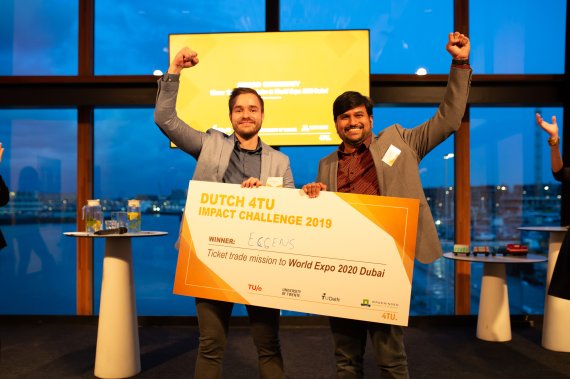The two developed a new type of biosensors that quickly and effectively detect cancer.
During the final of the Dutch 4TU Impact Challenge last week, the jury was very impressed with the idea of Beekman and Mathew’s ECsens start-up. Beekman is a PhD candidate in the Organic Chemistry Group and also works as a researcher at the University of Twente; Mathew is a researcher at the University of Twente. The two know each other from their days during their master’s programme in Nanotechnology in Twente and decided to join forces. Beekman: ‘My research is focused on biomarkers, and Dilu focuses on sensor technology.’
It not only benefits healthcare but could also help save a lot on healthcare costs.
Pepijn Beekman, PhD candidate in Organic Chemistry
Fast detection from a drop of blood
The researchers devised a new method that detects cancer in blood at an early stage using sensor technology. ‘Current methods for detecting cancer such as MRI and CT scans are invasive and slow’, Beekman says. ‘It’s also hard to draw any conclusions about the patient’s progress.’ Detecting cancer in blood is already possible, but it requires many tubes. The ECsens biosensors are hypersensitive, which means that a drop of blood can already be sufficient.
PM Rutte enthusiastic
Beekman was one of the four participants to pitch their idea to Dutch Prime Minister Mark Rutte. ‘I was given sixty seconds, but PM Rutte promptly interrupted me with the question whether this technique was only viable for diagnostics. When I explained that it also helps doctors to select the most effective medicine and to treat the illness in a much more targeted way, PM Rutte was very enthusiastic. He particularly liked that it not only benefits healthcare, but that we could also save a lot on healthcare costs. High-tech innovations usually cost a lot of money.’
Next step: World Expo
Beekman and Mathew won a ticket to the World Expo in Dubai in 2020, where they will have the opportunity to present their idea. Beekman: ‘It is great to be able to present on the same platform where innovations such as the television and the computer were introduced. There are 25 million visitors, and it obviously is a clear-cut opportunity to bring our technology to the attention of potential investors.’
Hit the market within six years
Beekman and Mathew’s technology already works well in lab environments. Next year, Beekman hopes to show that it also works with patients’ blood samples. ‘And, of course, we hope that this proof of concept will lead to large-scale clinical studies. But to perform those will cost millions, so we need sponsors. If all goes well, the technology could technically be put on the market within six years. We are currently applying for a patent.’

 Beekman (left) and Mathew (right) receive their prize.
Beekman (left) and Mathew (right) receive their prize.